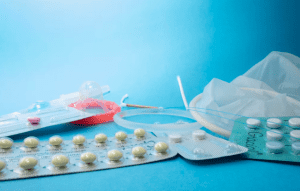Medically reviewed by Sophia Yen, MD, MPH – Written by Pandia Health Editorial Team




 [thrive_leads id=’18300′]
Disclaimer: The above information is for general informational purposes only and is NOT a substitute for professional medical advice. Always seek the advice of a healthcare provider before starting or changing treatment.
[thrive_leads id=’18300′]
Disclaimer: The above information is for general informational purposes only and is NOT a substitute for professional medical advice. Always seek the advice of a healthcare provider before starting or changing treatment.
Can Hormonal Birth Control Treat Anemia?
Anemia is a common health condition that ranges in severity from mildly uncomfortable to severe and life-threatening. Studies show that 20% of US women suffer from anemia. The following article explores the relationship between anemia and birth control.What can birth control do for anemia?
Hormonal birth control can be used to regulate an individual’s cycle by preventing menstruation from occurring entirely, or temporarily until the patient has been able to replenish their iron stores. Even if it’s not taken continuously, it is often associated with lighter periods, due to less build up of the uterine lining.What is the best birth control for anemia?
The hormonal IUD, pill, patch, ring, and shot can be used to treat or prevent iron deficiency. The copper IUD, however, can make periods heavier and should not be recommended to iron-deficient individuals. Combination birth control pills (a.k.a those containing both estrogen and progestin) are the most effective for preventing or lightening periods. That said, individuals who are over 35 and smoke and/or have a history of blood clots should not use combination birth control. Instead, the progestin-only pill may be a better option. [thrive_leads id=’18300′]What is anemia?
Anemia is a condition caused by lack of iron. This deficiency may be the result of several factors, but is most often related to a low-iron diet or blood loss. Individuals with anemia lack hemoglobin, or the oxygen-rich protein in red blood cells. When the body doesn’t have enough iron, it can’t produce hemoglobin. This, in turn, prevents oxygen from being delivered to the rest of the body, which leads to anemia.
What causes anemia?
Anemia has numerous potential causes including, but not limited to the following:Heavy periods
Individuals who commonly experience heavy periods are more likely to develop anemia due to excessive blood loss. While having occasional heavy periods is normal, frequently soaking through pads or tampons, bleeding for more than one week, or passing large blood clots may be indicative of a more serious disorder.
Pregnancy
During pregnancy, a woman needs twice the amount of hemoglobin to help supply oxygen to the growing fetus. If their body doesn’t get enough iron to support this process, they may develop anemia. To avoid anemia during pregnancy, it is suggested that women take iron supplements and prenatal vitamins.Gastrointestinal disorders
Disorders in the digestive tract, such as Crohn’s disease and celiac disease, may increase an individual’s risk of developing anemia. These disorders affect absorption of nutrients, which may lead to a lack of iron in the blood.Chronic health conditions
Certain chronic conditions that affect blood pressure, such as kidney disease, may cause a shortage of red blood cells over time. Furthermore, such conditions are commonly associated with anemia.A lack of iron in the diet
Diets that are consistently low in iron, such as vegetarianism, may lead to anemia. That said, it is possible to maintain a vegetarian diet and not develop anemia when additional iron-rich foods (i.e. nuts, whole grains, and leafy greens) are incorporated.
Family history
Some hereditary disorders, such as sickle cell anemia, impact the production of hemoglobin. If an individual has a family member with such a disorder, they may be more likely to experience anemia.What are the symptoms of anemia?
There are numerous common symptoms of anemia, often related to how the body reacts to a lack of blood or oxygen:- Weakness & fatigue
- Cold hands and feet
- Pale skin
- Rapid heart rate
- Chest pain and/or shortness of breath
- Headaches
- Brittle nails
- Muscle cramps
- Insomnia
- Difficulty concentrating
How is anemia diagnosed?
If an individual shows symptoms that point towards anemia, a doctor may order one or more of the following to confirm the specific diagnosis:- Complete Blood Count (CBC) – determines the number, size, volume, and hemoglobin content of red blood cells
- Hematocrit – tests the percentage of red blood cells in the blood
- Hemoglobin test – checks the amount of hemoglobin in the blood using a range of grams per decimeter
- Iron level test – measures how much iron a person has in transit in their body
- Ferritin – tests the body’s capacity to absorb iron
- TIBC (total iron-binding capacity) – tests the body’s ability to attach itself to iron and transport it around the body
- Transferrin test – measures how much transferrin, which transports iron around the body, a person has
What are the complications of anemia?
Mild anemia typically doesn’t result in serious health complications. However, if left untreated, it may progress to a severe iron deficiency. Individuals with this condition may be at risk for the following:Heart problems
Anemia is often linked to heart disease as a result of the heart working harder to pump blood and oxygen throughout the body. Additionally, individuals with heart disease may worsen their condition if they develop anemia due to the increased strain on their heart. Even if this is not the case, anemia may cause irregular heart rate, which can further lead to heart failure.Pregnancy complications
While mild anemia is common during the second and third trimesters of pregnancy, at its more severe level, it can increase the risk of a pre-term delivery and a low-birth-weight baby. Furthermore, it is especially important for pregnant individuals to report symptoms of anemia early on in order to receive effective treatment.
Increased risk of infection
The lack of iron caused by anemia can negatively impact the immune system (a.k.a the body’s natural defense system). This increases the body’s vulnerability to infection.What can be done to treat anemia?
Fortunately, many cases of anemia can be treated. While some treatments require support from a healthcare provider, others simply involve minor lifestyle changes.Food sources and iron supplements
Taking iron supplements and eating iron-rich foods can increase the body’s iron stores. The iron found in meat is called heme iron. The iron in plants such as lentils, beans, and spinach, as well as in iron-enriched and iron-fortified foods, is non-heme iron. Our bodies are less efficient at absorbing non-heme iron compared to heme iron. That said, both sources of iron can be incorporated into a balanced diet.Blood transfusion
A blood transfusion can help the body gain the red blood cells it needs to function properly. This is only recommended in instances of severe anemia where red blood cell levels are dangerously low. It can rectify the issue immediately, as blood is transfused directly to the patient via an IV line in one of their blood vessels.Birth control
If an individual experiences anemia due to heavy and/or frequent periods, birth control can be used to help. It is possible to take the pill, patch, and ring continuously in order to skip your period. When there is no blood loss, anemia is less likely to occur.
What’s the takeaway?
Anemia is caused by lack of hemoglobin, the iron-rich protein in the blood. It is a common health condition, but can be treated. If you experience symptoms of anemia, consult a doctor, as they can help determine the best plan of action.How can Pandia Health help?
One way to prevent anemia is by managing your periods. Our CEO & co-founder, Dr. Yen promotes making #periodsoptional by taking birth control. Speaking of which, Pandia Health provides a FREE delivery service to patients in all 50 states. If you currently take the pill, patch, or ring, sign up to transfer your prescription to our pharmacy. Join our community of empowered people with uteri by taking charge of your own reproductive health.Frequently Asked Questions
Is being anemic bad?
Having mild anemia typically doesn’t lead to serious health consequences, as it can be easily treated. That said, severe cases could have negative impacts on heart health, pregnancy, and/or the immune system.
Does being anemic make your period worse?
Anemia is linked to a condition called menorrhagia, which entails abnormally heavy periods. That said, anemia may also have no effect on your period.
Can periods cause anemia?
Frequent heavy periods can lead to anemia due to excessive blood loss.

